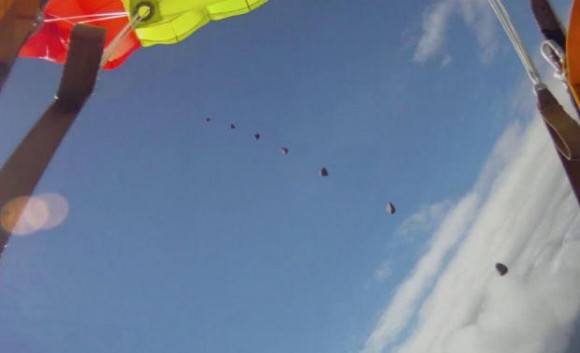| Online: | |
| Visits: | |
| Stories: |

| Story Views | |
| Now: | |
| Last Hour: | |
| Last 24 Hours: | |
| Total: | |
Norwegian Skydiver Almost Gets Hit By Falling Meteor — And Captures It On Film

A multiple frame picture of the meteorite falling. Credit and copyright: Anders Helstrup, used by permission.
It sounds like a remarkable story, almost unbelievable: Anders Helstrup went skydiving nearly two years ago near Hedmark, Norway and while he didn’t realize it at the time, when he reviewed the footage taken by two cameras fixed to his helmet during the dive, he saw a rock plummet past him. He took it to experts and they realized he had captured a meteorite falling during its “dark flight” — when it has been slowed by atmospheric braking, and has cooled and is no longer luminous.
Norwegian astrophysicist Pål Brekke confirmed to Universe Today that the story is true. “I was part of the investigation – and kept secret for two years – in hope of finding the meteorite,” Brekke said via Twitter.
Since the search for the meteorite has come up empty so far, Helstrup’s story and video has been released in an effort to recruit more people to look for the rock.
“It has been a little hard to keep is as a secret,” Helstrup told Universe Today via email, “but everyone has been loyal to the project and helped us out!”
Here’s the video:
(…)
Read the rest of Norwegian Skydiver Almost Gets Hit by Falling Meteor — and Captures it on Film (364 words)
© nancy for Universe Today, 2014. | Permalink | No comment |
Post tags: Meteorites, meteors
Feed enhanced by Better Feed from Ozh
Source: http://www.universetoday.com/110963/norwegian-skydiver-almost-gets-hit-by-falling-meteor-and-captures-it-on-film/





That was falling too slow to be a meteorite. I think it was a lavatory dump from Malaysia flight 370.
Sorry, the meteor would of been leaving a trail behind from the atmospheric fiction of entering our atmosphere. To me this doesn’t seem plausible.
Meteorites can slow down, lose their forward speed, and drop. They don’t have a vapor trail then.
Or smoke.
(Shorty and ElOregonian must not have seen many meteors — so they should consider that meteorites are often found lying on the ground, or on ice.)
I’ve experienced a meteorite flying by, close enough to be annoying loud. I’ve seen a meteorite burst into fragments and smoke, high overhead. I’ve seen a glowing meteorite’s trajectory curve downward, to near-vertical.
But check out what the article says: “He took it to experts and they realized he had captured a meteorite falling during its “dark flight” — when it has been slowed by atmospheric braking, and has cooled and is no longer luminous.
Norwegian astrophysicist Pål Brekke confirmed to Universe Today that the story is true. “